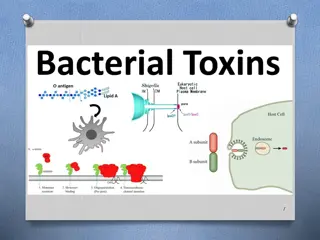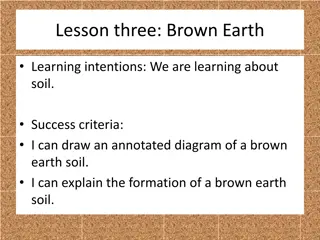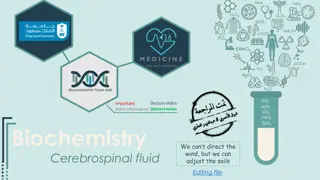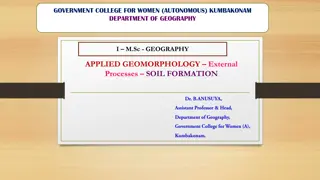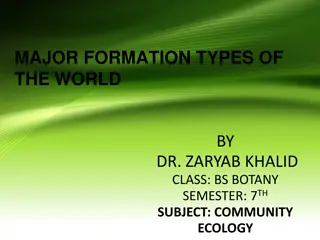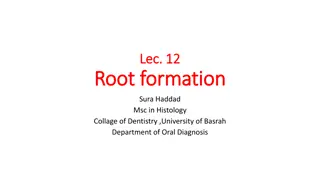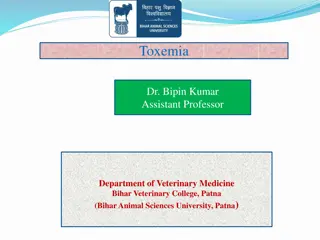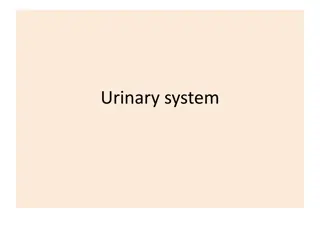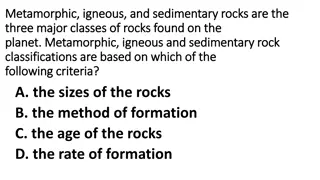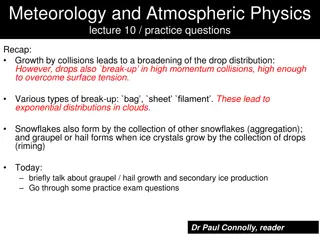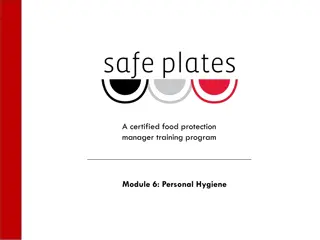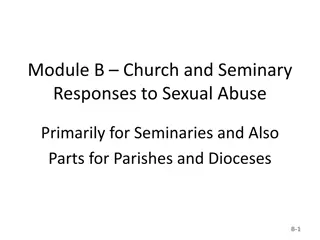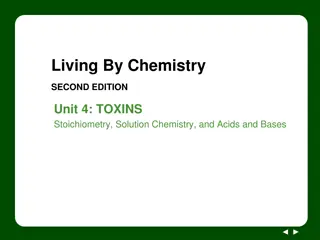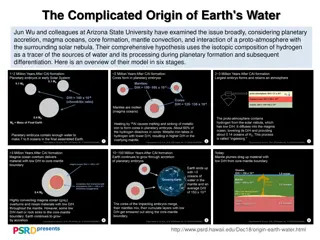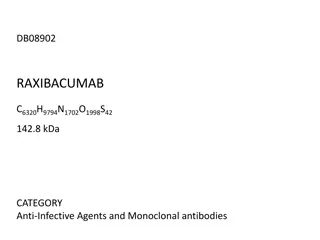Understanding the Rite of Profession for Formation in Religious Orders
The Rite of Profession plays a vital role in the formation process for those entering religious orders, emphasizing the significance of commitment, rituals, sacraments, and essential elements such as questioning, symbols, and assent. It serves as an instructive and affirming experience for individua
0 views • 21 slides
Biological Registration Process and Administrative Controls for Safety Focus
Registering work involving biological materials, toxins, and recombinant DNA is essential for safety compliance. Principal Investigators must follow NIH guidelines and register with the Institutional Biosafety Committee. Contact NIH for additional instructions on working with toxins and Select Agent
4 views • 13 slides
Understanding Bacterial Toxins and Cell Damage
Bacterial toxins are poisonous substances produced by microbes that can cause harm to host cells through direct damage, toxin production, and hypersensitivity reactions. Toxigenesis is a crucial mechanism used by bacterial pathogens to induce disease, with endotoxins and exotoxins playing distinct r
2 views • 28 slides
Deacon Formation Process in Diocese of Fort Worth Overview
This overview provides insights into the deacon formation and admissions process in the Diocese of Fort Worth. It emphasizes the importance of service, faith, and transformative journey in the formation process, along with stages such as initial inquiry, aspirant stage, candidate stage, ordination t
3 views • 27 slides
Evangelization and Faith Formation: Strengthening Catholic Men's Spiritual Journey
Explore the vital role of evangelization and faith formation in nurturing Catholic men's spirituality. Discover the essence of active relationship with God, ongoing formation in faith, life of prayer, and brotherhood. Learn about key elements like prayer, formation, and fraternity through initiative
1 views • 35 slides
Gir Cow Ghee A Touch of Tradition with Goseva's Gir Cow and A2 Ghee
Crafted with the essence of Gir Cow Dung, these charcoal-free dhoop sticks offer a toxin-free aromatic experience, steering clear of the harmful fumes associated with traditional black dhoop battis. Infused with aromatic essential oils, the Goseva Kapur Dhoop Sticks provide a long-lasting, soothing
2 views • 5 slides
Formation of Hertwig's Epithelial Root Sheath in Tooth Development
The formation of Hertwig's Epithelial Root Sheath (HERS) is crucial in determining the shape, length, and number of roots in teeth. It initiates the formation of radicular dentin, marking the beginning of root development after enamel and dentin formation. HERS consists of outer and inner enamel epi
0 views • 29 slides
Understanding Brown Earth Soil Formation in Temperate Broadleaved Forests
Brown Earth soils are characteristic of temperate broadleaved deciduous forests in regions like Western Europe, Russia, and North America. Deciduous trees contribute to the formation of these soils by providing a rich leaf litter that breaks down rapidly due to the mild climate. Soil organisms play
1 views • 17 slides
Understanding Cerebrospinal Fluid (CSF): Functions, Formation, and Circulation
Cerebrospinal fluid (CSF) plays a vital role in providing a controlled chemical environment, nutrient supply, waste removal, and physical support and protection to the brain and spinal cord. This fluid circulates around the central nervous system, and its formation involves processes like selective
0 views • 23 slides
Various Word Formation Processes in Professional English
Explore the word formation processes in professional English, including coinage, borrowing, compounding, derivation, blending, backformation, and acronym formation. Each process involves unique methods and examples, contributing to the diversity and richness of the English language.
0 views • 11 slides
Understanding Soil Formation: Factors and Processes Explained
Soil formation is a complex process influenced by factors like parent material, topography, climate, organisms, and time. This article delves into the fundamentals of soil evolution, discussing how soils are formed from weathered rock materials and the role of pedogenesis. Factors affecting soil for
1 views • 28 slides
Evolution of the Ratio Formationis Generalis in Congregational Formation
Evolution and significance of the Ratio Formationis Generalis in Congregational Formation, from its historical development to the need for updates in response to changes in formation programs and Vatican documents. The formation of Units, Conferences, Directories, and Programs based on the Ratio, hi
4 views • 16 slides
Understanding Repair by Connective Tissue in Healing Processes
Healing or repair by connective tissue occurs in response to severe or chronic tissue injuries, leading to the replacement of nonregenerated cells with connective tissue or scar formation. This process involves the induction of fibroblast and endothelial cell proliferation, granulation tissue format
3 views • 26 slides
Company Formation Process and Role of Promoters
A company is a legal entity separate from its members, formed for a common purpose. The formation involves stages like promotion, investigation, planning, and financing. Promoters play a crucial role in initiating and incorporating a company, conducting market research, preparing business plans, and
1 views • 23 slides
Major Formation Types of the World by Dr. Zaryab Khalid - BS Botany Semester 7
This presentation by Dr. Zaryab Khalid explores the major formation types of the world in the field of community ecology. It delves into the classification of natural and cultural vegetations, the concept of formation classes and subclasses, and details the six natural formation classes along with e
2 views • 7 slides
Root Development in Tooth Growth Process
Root formation plays a crucial role in the development of teeth, starting after enamel and dentin formation at the cementoenamel junction. Hertwig's epithelial root sheath (HERS) molds the shape of roots, initiating radicular dentin formation. The cervical loop forms an epithelial diaphragm, narrowi
0 views • 23 slides
Understanding Toxemia in Veterinary Medicine
Toxemia is a systemic condition triggered by toxins from bacteria or tissue injury, not plant or insect toxins. Endotoxemia, caused by LPS cell components of Gram-negative bacteria, leads to severe physiological abnormalities. Etiology involves various toxin types, including exotoxins and enterotoxi
1 views • 15 slides
Understanding the Urinary System: Kidneys, Functions, and Structure
The urinary system, also known as the renal system, consists of the kidneys, ureters, bladder, and urethra. Each kidney contains nephrons, the functional units responsible for filtering waste and regulating blood volume, pressure, electrolytes, and pH balance. The kidneys have an extensive blood sup
0 views • 35 slides
Buy Botox 200U Online - dermafillerstore.com
Buy Botox 200U Online is a brand name for a toxin produced by the bacterium Clostridium botulinum. Although it's best known for its cosmetic use in reducing the appearance of wrinkles, Botox is also used for various medical conditions, such as chroni
1 views • 4 slides
Understanding Achalasia: Therapeutic Approaches, Pathophysiology, and Clinical Manifestations
Achalasia is characterized by a failure of the lower esophageal sphincter to relax, leading to difficulty in swallowing and regurgitation. The exact cause is unknown, but autoimmune factors and chronic infections may play a role. Symptoms include dysphagia, chest pain, regurgitation, and weight loss
0 views • 59 slides
Understanding Rocks: Types, Formation, and Properties
Rocks can be classified as metamorphic, igneous, or sedimentary based on their formation processes. Florida's phosphate deposits and pumice formation showcase the diversity of rocks. A scientist's rock cycle model helps predict changes, while pressure on sediments leads to new rock formation. Basalt
1 views • 22 slides
Challenges and Perspectives in Catholic Board Formation
Exploring the essential aspects of board formation in Catholic educational institutions, this content delves into models of formation, institutional needs, perspectives on faith formation, questions for reflection, governance from a mission perspective, and the significance of undertaking board form
1 views • 24 slides
Exploring Earth's Oceans: From Formation to Technology
Earth's oceans are interconnected bodies of water covering about 70% of the planet. This chapter delves into the formation of oceans, the composition of seawater, the structure of the seafloor, and the technology used to explore the depths. Learn about the theories behind ocean formation, the differ
0 views • 24 slides
Understanding Ice Formation and Growth in Clouds
Exploring the processes of ice formation and growth in clouds, including the role of collisions, break-up, aggregation, riming, and secondary ice production. Various factors influencing ice crystal concentrations and their interplay with ice nuclei are discussed. Images and data depict the relations
0 views • 35 slides
Understanding Fats and Oils: Properties and Formation
Learn about the properties of fats and oils, including their formation through a condensation reaction of glycerol with fatty acids. Explore the role of fats in the diet, different types of natural fats and oils, and the chemical composition of triglycerides. Discover the significance of fatty acids
0 views • 17 slides
Managing Staphylococcus Risks in Food Preparation
Learn about a foodborne illness outbreak linked to Staphylococcus aureus, caused by improper food handling practices. Understand the symptoms, likely causes, and prevention strategies to minimize the risk of toxin formation. Explore best practices and key terms related to food safety.
0 views • 27 slides
Church Responses to Sexual Abuse in Seminaries and Parishes
This article discusses the responses of the Church and seminaries to sexual abuse primarily focusing on minors by Catholic priests in the United States. It highlights key data reports presented to the United States Conference of Catholic Bishops, Church directives on formation for celibacy and sexua
0 views • 20 slides
Understanding Microbiology Lab Results: Case Study of Mrs. Septic's Infection
In this case study, Mrs. Septic's blood cultures are growing gram-positive cocci, leading to a differential diagnosis involving various bacterial pathogens. Through a series of microbiology lab findings, the causative organism, Staphylococcus aureus, is identified. Further complications arise, indic
0 views • 73 slides
Evolution of Compact Star-Forming Galaxies and Quiescent Galaxies
The evolution of galaxies from compact star-forming to quiescent states involves processes such as secular evolution, gas inflows, and star formation quenching. By studying the structural relations and star formation in these galaxies, insights are gained into their transition towards quiescence. Th
0 views • 12 slides
Tactical Formation Maneuvering for T-44C Aircraft
This presentation provides essential knowledge for conducting tactical formation flights in the T-44C aircraft, covering formation types, fundamentals, maneuvers, and division formations. It outlines the importance of formation unity, maneuverability, and coordination, along with considerations like
0 views • 41 slides
Overview of Corynebacterium diphtheriae Pathogenesis and Virulence Factors
Corynebacterium diphtheriae is a non-spore forming Gram-positive bacillus responsible for causing diphtheria in humans. This bacterium, particularly C. diphtheriae, is known for producing a potent exotoxin called diphtheria toxin, which blocks protein synthesis and leads to serious complications suc
0 views • 25 slides
Understanding Bacterial Toxins: Production, Types, and Effects
Explore the world of bacterial toxins, focusing on production mechanisms, various types such as cytotoxins and their effects on host cells. Delve into specific examples like Diphtheria Toxin caused by Corynebacterium diphtheriae, understanding its biological features and the disease it leads to.
0 views • 13 slides
Trap Tox in Dubai.pptx
Trap Tox refers to a cosmetic procedure where Botox (botulinum toxin) is injected into the trapezius muscles, which are the muscles located between the shoulders and neck. This treatment is designed to relax these muscles.
4 views • 5 slides
Implications of Star Formation in the Central Parsec of Our Galaxy with Subaru Observations
Researchers presented implications of star formation in the central parsec of our Galaxy using Subaru observations at the 2014 Subaru Users Meeting. The study focused on the supermassive black hole Sgr A* and the challenges posed by conditions in the Galactic Center for star formation. Various scena
0 views • 30 slides
Understanding Toxicity Through Stoichiometry and Molar Mass
Delve into the world of toxicity analysis by comparing the amounts of different substances using moles and molar mass. Explore the safety of sweeteners and learn how to utilize these concepts to assess toxicity levels. Engage in thought-provoking discussions and activities to deepen your understandi
0 views • 10 slides
The Complicated Formation of Earth's Water: A Detailed Overview
Jun Wu and colleagues at Arizona State University have developed a comprehensive model to explain the origin of Earth's water through stages such as planetary accretion, core formation, and interactions with the solar nebula. By tracing the isotopic composition of hydrogen, they explore how water so
0 views • 7 slides
Botulinum Toxin in dubai
Botulinum toxin is a neurotoxic protein produced by the bacterium Clostridium botulinum. It is commonly known under brand names like Botox, Dysport, Xeomin, and others. Botulinum toxin works by temporarily paralyzing muscle activity, making it effect
0 views • 5 slides
Raxibacumab: Monoclonal Antibody for Inhalational Anthrax
Raxibacumab is a human IgG1 monoclonal antibody designed to treat and prevent inhalational anthrax caused by Bacillus anthracis. It targets the protective antigen component of the anthrax toxin, inhibiting its binding to cellular receptors and preventing toxin entry. Administered via IV infusion, Ra
0 views • 6 slides
Managing Solid Waste: Importance, Risks, and Solutions
Solid waste management is crucial to address environmental hazards such as disease spread, respiratory issues, and toxin release. By reducing and managing solid waste effectively, we can improve public health and prevent pollution of soil and water bodies. The presentation highlights reasons to mini
0 views • 64 slides
Understanding Standard Molar Enthalpies of Formation
Formation reactions involve substances being created from elements in their standard states, with the enthalpy change known as the standard molar enthalpy of formation (Hf). This enthalpy represents the energy released or absorbed when one mole of a compound is formed from its elements in their stan
0 views • 13 slides


